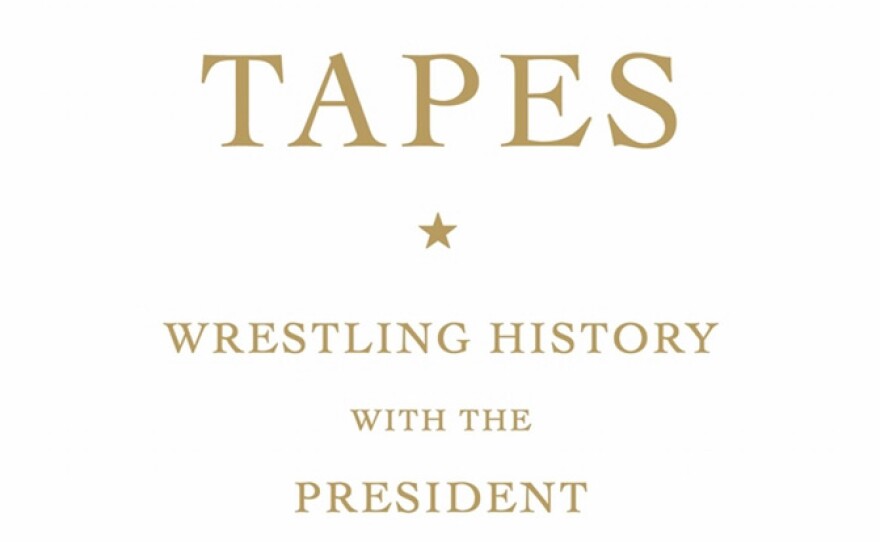President Clinton found me waiting alone in his upstairs office called the Treaty Room, testing my tiny twin recorders on one corner of a massive but graceful Victorian desk. It contained a drawer for each cabinet department under Ulysses Grant, he observed, when Washington could be run from a single piece of furniture. The president invited me to begin our work in another room, and I gave him sample historical transcripts to look over while I repacked my briefcase. He scanned to lively passages. An anguished Lyndon Johnson was telling Georgia senator Richard Russell in 1964 that the idea of sending combat soldiers to Vietnam "makes the chills run up my back." A flirtatious LBJ was pleading with publisher Katharine Graham for kinder coverage in her Washington Post. Clinton asked about Johnson's telephone taping system. How did it work? How did he keep it secret? For a moment, he seemed to dare the unthinkable. White House recordings have been taboo since their raw authenticity drove Richard Nixon from office in 1974. Most tapes of the Cold War presidents still lay unknown or neglected. By the time scholars and future readers realize their incomparable value for history, these unfiltered ears to a people's government will be long since extinct. To compensate for that loss, Clinton had resolved to tape a periodic diary with my help.
The president led west through his official residence. Its stately decor would become familiar and often comforting, but for now my nerves reduced the Treaty Room to a blurry mass of burgundy around tall bookcases and a giant Heriz rug. Ahead, walls of rich yellow enveloped a long central hall of movie-set patriotism that clashed for me with Clinton's solitary ease. He wore casual slacks and carried a book about President Kennedy under an arm. His manner betrayed no pomp, and his speech retained the colloquial Southernism we had shared as youthful campaign partners in 1972, before the twenty-year gap in our acquaintance. I suffered flashes of Rip van Winkle disorientation that a lost roommate had turned up President of the United States. Now, instead of rehashing the day's crises with co-workers at Scholz's beer garden in Austin, Texas, I followed Clinton into a family parlor next to the bedroom he shared with Hillary. The plump sofas and console television could have belonged to a cozy hotel suite. Red folders identified classified night reading, marked for action or information. Crossword puzzles and playing cards mingled with books. On one wall, there was a stylized painting of their precocious daughter Chelsea, then thirteen, dressed up like a cross between Bo Peep and Bette Midler.
We sat down at his card table. I retrieved two items to help me prompt him with questions: a daily log of major political events, compiled mostly from newspapers, and a stenographer's notepad listing priority topics for this trial session. With the microcassette recorders placed between us, I noted the time and occasion for the record. From the start, Clinton's history project adapted to obstacles beyond the lack of precedent or guidance. We raced to catch up with a daunting backlog from his first nine tumultuous months in office. He sought to recall a president's firsthand experience, but the job intruded within minutes in a call from his chief congressional liaison, Howard Paster. When I started to leave for his privacy, the president beckoned me to stay. He jotted down the names of five senators, asked an operator to find them, and told me the Senate was voting late that night on Arizona Republican John McCain's amendment requiring the immediate withdrawal of U.S. troops from Somalia. Only eleven days ago, forces loyal to Somali warlord Mohamed Farah Aidid had shot down two Black Hawk helicopters, killed nineteen Rangers, and dragged American corpses through the streets of Mogadishu in a searing disaster that Clinton likened to JFK's Bay of Pigs. Now the president said he must convince five swing senators or suffer a political defeat that he believed would injure the country.
I turned off the recorders to weigh unforeseen questions. Why not tape the president's side of these conversations? That would preserve his actual performance — lobbying, cajoling, being president — in addition to his private memories. After all, Clinton had just contemplated the treasure of predecessors who taped both sides of their business calls. To record only his words would avoid the ethical drawbacks of taping others without their knowledge or consent. On the other hand, posterity would get only half the exchange — what I was hearing, without the senators' interaction — which would be hard to decipher. Also, could the president himself be sure that recording would not inhibit him? How could we secure a vivid, accurate past without harming the present?
It seemed prudent on balance to tape, but there was precious little time to analyze such judgments. No sooner did Clinton finish with one senator than a White House operator buzzed with another on the line. He was on the phone before I could confirm my rationale with him, and I merely pointed to the little red lights on the recorders when I turned them back on. He nodded. I did not emphasize the gesture for fear of breaking his concentration, or of signaling alarm when I meant to convey assurance. The president worked his way through the list for more than half an hour. "Harry Reid [Democrat of Nevada] is the most underrated man in the Senate," he remarked between calls, then plunged again to solicit support. "Can you help me out on this?" he asked. He told them he had "bent over backward" to forge a compromise with Senator Robert Byrd, Democrat of West Virginia, who also favored immediate withdrawal, binding the administration to leave Somalia within six months unless Congress agreed otherwise.
Excerpted with permission from The Clinton Tapes: Wrestling History with the President by Taylor Branch. Published by Simon & Schuster, September 2009.
Copyright 2023 NPR. To see more, visit https://www.npr.org. 9(MDM3NjYwMjA5MDE1MjA1MzQ1NDk1N2ZmZQ004))


